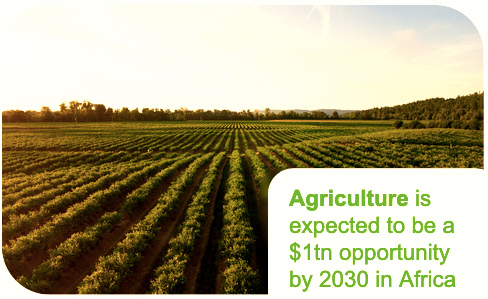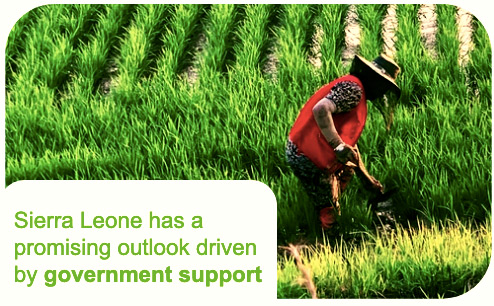Robust Demand Outlook
Sierra Leone has a strong domestic agricultural market which is ready for foreign investments

Regional Outlook
Driven by a steady increase in the continent’s population, rapid urbanization, and a burgeoning middle class, the agricultural sector in Africa is expected to grow beyond $1 trillion by 2030.
AfDb, in-particular is investing over $25bn over a ten-year time frame to help usher in agricultural transformation and economic modernization across Africa.

Resilient Domestic Market
Sierra Leone has a resilient domestic market owing to the three factors elaborated below:
Fertile soils and abundant rainfall
Sierra Leone has abundant rainfall (3800mm annually) and soil conducive to the cultivation of crops.
Abundant land resources for agriculture
SL has over 5.4m hectares of arable land out of which 75% is available for cultivation.
Large domestic market opportunity
Sierra Leone has a growing domestic market driven by a steady increase in population, rapid urbanization and increasing purchasing power.

Future Prospects
The Agricultural sector is a strategic sector for Sierra Leone and increasing agricultural productivity is central to the government’s food security and poverty reduction goals.
To that end, Sierra Leone recently launched its National Agricultural Transformation Programme 2023 to double production from existing levels and attract foreign investors to the country.
Source: Wavteq based on AfDb, SLIEPA, Netherlands Enterprise Agency
Sierra Leone’s agricultural demand prospects are robust and on a steady upward trajectory
Population of Sierra Leone (in millions)
2010-2020, total

The population of Sierra Leone has, on average, grown by 2% annually between 2010 and 2020. Sierra Leone has also witnessed rapid urbanization with the urban population growing to ~43% as of 2020.
When both these factors are combined, Sierra Leone is an attractive destination for investors driven by the steady upward trajectory of the total addressable market and growing consumption of agricultural products.
Source: Wavteq based on World Bank, Knoema



